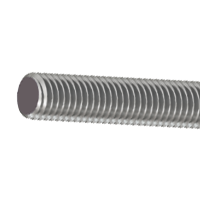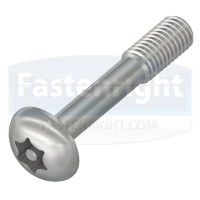Making sure that you have the correct fastener for your application is indispensable in ensuring your work is successful – and sometimes projects need the use of several diverse types of fasteners to be assured that the application runs smoothly, often seeing multiple bolts, anchors and washers used in conjunction.
Some of the most common basic fasteners are screws and bolts, and include:
- Hex bolts – which are otherwise known as hex cap screws. These are used in machinery and construction and can be used alongside a nut or in a tapped hole. When these bolts are fully threaded they are sometimes referred to as tap bolts.
- Wood screws – which have large threads and a smooth shank used to pull two pieces of material together. These are often used in wood or other softer materials.
- Sheet metal screws – which host sharp points and threads, and are designed to be driven directly into sheet metal as their name suggests. They can be used within softer materials like plastic, fiberglass or wood.
- Machine screws – these are fully threaded and used alongside a nut or in a tapped hole. Certain types of these fasteners are, at times, referred to as stove bolts.
- Socket screws – these are machine screws, as above, but with an internal hex socket drive – which is otherwise known as an Allen drive. Sometimes longer lengths may have a smooth shank.
- Lag bolts – often also referred to as lag screws, these are large wood screws with hex heads. These are typically used for wood construction and landscaping.
- Carriage bolts – these bolts are known for having smooth, domed heads and a square section underneath that pulls into the material. This prevents spinning during installation.
What is the Right Fastener for Your Application?
There, of course, is a wide range of fasteners available for multiple applications, and it’s vital that you ensure that you have the right fastener for your application. These can include screws, nails, anchors, nuts and bolts, as well as much more.
We’re going to break down the different types of fasteners and how they may be applicable for your application.
Screws
Different screws are used across different types of applications. Examples of this may be that some screws might be more suited to heavy duty projects, or outdoor projects, as they will have been manufactured to endure certain elements.
The types of heads for the screws are significant and include pan heads, oval heads, flat heads and truss heads. Pan heads are one of the most prevalent types of heads that are found within screws, with rounded and short vertical sides that provide a low profile when driven into a surface. Flat heads are countersunk and sit flush in the surface in which it is drilled into. Truss heads host large heads with a flat underside and a rounded top and provide a low profile that sits just above the line of the surface. Oval heads combine pan and flat head types, with the head being slightly rounded for a more decorative finish.
Types of screws include socket screws, which host an internal hex socket, or Allen drive. There are also self-tapping screws, which can tap their own hole into a material that it is being driven into. They come in a wide range of tip and thread patterns and are available with a range of heads. They are often fully threaded.
Self-drilling screws are also an option, which eradicates the need for the pre-drilled hole which allows drilling and fastening to be done in one swift motion.
Bolts & Nuts
Bolts
Bolts are a popular choice for when nails can’t be used and screws will not provide a durable enough hold.
There are hex bolts, which host a hexagonal head with threads that are used with a nut or a tapped hole. Other types of bolts include carriage bolts, which have a smooth and rounded head that has a small square section underneath, and lag bolts which have a thread and tip (pointed) that are designed for use within wood.
Other popular bolts include eye bolts, which have a circular ring on the head end which is used for attaching a rope or a chain and subsequently used in weight distribution during lifting, J-Bolts, which are used for tie-downs or as an open Eye Bolt – and as their name suggests they are shaped like a J. Much like a J-Bolt, there’s a U-Bolt, which is shaped like a U for attaching to piping or other rounded surfaces, but is also available with a square bend.
Perhaps the most commonly used or required bolt is a Sex Bolt, otherwise referred to as a barrel nut or a Chicago bolt. They have a female thread and are used for through bolting applications where a head is desired on both ends of the joined fastener.
There is also the possibility of using elevator bolts – with a large, flat head, which is often used in conveyor systems, and hanger bolts, which have a wooden thread on one end and machine thread on the other.
Nuts
Nuts are small objects that are more often than not fastened to a bolt, and the two fasteners are generally used together – providing great security and high load bearing.
When the bolts run through the nut, this creates a strong bond that is able to withstand a huge amount of stress. Sizes can vary with nuts, and the size of nut required can change depending on the application.
When tightening and removing these nuts, a tool will be required.
There are a number of types of nuts available, including Hex Nuts and Heavy Hex Nuts. Hex nuts are six-sided and often referred to as a Finished Hex Nut, and as you would imagine a Heavy Hex Nut is literally just the standard Hex Nut but with a heavier pattern. There are also Jam Nuts, which are Hex Nuts with reduced height.
Nylon Insert Locks are popular choices. They are nuts with nylon inserts to prevent backing off, and they are often referred to as a Nylock Nut. Other types of Nylock Nuts include a Nylon Insert Jam Lock, which is the same nut but with reduced height.
Other popular nuts include Flange Nuts, which host a built-in washer-like flange, Square Nuts, which host four sides and Coupling Nuts – which are long nuts used to connect pieces of threaded rod or other male fasteners.
More specialised nuts can also be used across applications, including Cap Nuts which are nuts with a domed top over the end of the fastener, and Acorn Nuts which are Cap Nuts with a high crown and often used for aesthetic reasons. There’s also Wing Nuts, which are designed for hand tightening due to the easy to grip ‘wings’ on the nuts.
In high-temperature applications, Prevailing Torque Locks are one of the better options, achieving their torque by altering the shape of the nut, most commonly be distorting the threads of the nut.
There are also Kep Nuts, Slotted Nuts and Castle Nuts, which are all used to prevent loosening, with the former using an external tooth lock washer, and the latter two using a cotter pin on drilled shank fasteners.
Anchors
Anchors come in a number of different types, all of which are used within different types of wall material, including wood, metal, concrete, mortar, tile, brick and stone.
Anchor bolts can be used with a variety of materials including concrete, brick and stone and there an array of different anchors that are suitable for each material.
Loose bolts are ideal for use with solid materials such as concrete and bricks, but they may struggle when the brick is hollow. Projection bolts are great for fixing into masonry and concrete, and hook bolts are great in brick, concrete and blocks.
A Wide Range of Fasteners Available from Fastenright
Including those which are mentioned above, we have a wide range of different fasteners available from both stock and available to order.
Alongside anchors, nuts, bolts and screws, we also provide security bits, tools and drivers to assist with the fastening of certain fixings, as well as a wide range of security products.
If you would like to discuss these products further, or how they can benefit your application, then please do give us a call.




